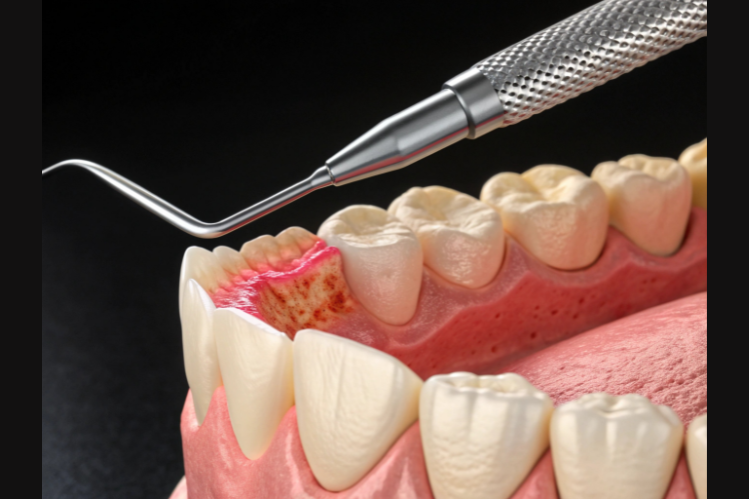
Table of Contents
You brush your teeth every day, maybe even floss when you remember, but your gums still bleed sometimes. You probably shrug it off, thinking it’s no big deal. But then the question hits: can this actually spread to someone else?
Here’s the thing: Gingivitis sounds like one of those “only if you ignore it” problems, but it’s a lot more common (and trickier) than people think. It’s basically your gums waving a red flag that something’s not right. And yes, in some cases, it can be contagious, but not in the way most people imagine.
In this blog, we’ll break it down, is gum disease contagious, and what you can do to stop it from becoming a bigger issue. Especially if you’re planning to get aligners soon, healthy gums are step one to a confident smile.
What Is Gingivitis?
Gingivitis is basically the early stage of gum disease. It starts when plaque, that sticky film of bacteria that builds up on your teeth, hangs around too long. If you don’t brush or floss properly, that plaque hardens into tartar, and your gums start reacting to it.
You’ll notice it through small signs first. Maybe your gums look a bit red or puffy. Maybe they bleed a little when you brush. It doesn’t usually hurt, so most people just ignore it. But that’s the tricky part, it’s quiet, and before you know it, it can turn into a more serious infection called periodontitis, which damages the bone that holds your teeth in place.
So, in short: gingivitis isn’t something to panic about, but it’s also not something to leave alone. The good news is it’s completely reversible if you catch it early.
Is Gingivitis Contagious?
Here’s the part most people don’t realise: yes, gingivitis can be contagious, but not in the way you might think. You’re not going to “catch it” just by sitting next to someone. But the bacteria that cause gingivitis can transfer from one mouth to another through saliva.
So if you share a toothbrush, kiss your partner, or even share utensils, there’s a chance those bacteria can make their way over. Of course, just because the bacteria transfer doesn’t mean you’ll instantly develop gum disease. It really depends on your own oral hygiene and immune response.
Think of it this way, it’s like sharing a cold. The germs can pass along easily, but whether or not you get sick depends on how healthy your system is. The same goes for your gums.
One of the best tips to keep teeth gums healthy is keeping your mouth clean and sticking to your brushing and flossing routine. This means you can still kiss your loved ones without stressing about “catching” gingivitis.
How Gingivitis Spreads
Let’s break it down simply. Gingivitis starts with bacteria, and bacteria love places where they can hide. Plaque is basically their home base. When you don’t clean it off properly, it hardens into tartar, and that’s when things start getting messy for your gums.
Now, if someone already has gingivitis, their saliva will have more of those bacteria floating around. So every time you share a straw, or even bite into the same sandwich, you’re kind of swapping some of that bacteria. Gross, but true.
That’s how gingivitis “spreads,” not like a cold in the air, but through direct saliva contact. The good news? You’re not doomed if you’ve been exposed. Bacteria can’t do much damage if you brush twice a day, floss, and get your regular cleanings done.
So, if you are asking yourself, can you get gum disease from kissing? It’s not just about who you kiss, it’s about how well you clean your teeth afterwards.

Signs You Might Have Gingivitis
Here’s the thing, gingivitis doesn’t always hurt at first. That’s why most people don’t even realize they have it until their gums start acting up. But there are a few early signs that are pretty easy to spot once you know what to look for:
- Bleeding gums: You notice pink in the sink after brushing or flossing. That’s not normal.
- Swollen or puffy gums: They feel tender, and brushing them might sting a bit.
- Bad breath that doesn’t go away: No amount of mint or mouthwash can cover it up.
- Receding gums: Your teeth start looking a little “longer” than before.
- Red or shiny gums: Healthy gums should look firm and pink, not irritated or glossy.
Most people brush it off (literally), thinking they just pressed too hard with their toothbrush. But these are early warning signs your gums are basically trying to tell you something’s wrong.
If you catch gingivitis early, it’s completely reversible with proper cleaning and care. Ignore it for too long, and it can turn into periodontitis, and that’s where real damage begins.
Who’s Most at Risk for Gingivitis?
Some people can skip flossing for a few days and walk away fine. Others miss one night, and their gums are already irritated. The difference usually comes down to habits and sometimes, just bad luck (or genetics).
Here’s who’s more likely to get gingivitis:
- People who don’t floss regularly: Plaque builds up fast, and gums are the first to suffer.
- Smokers or vapers: Nicotine messes with blood flow in your gums, making it harder for them to heal.
- Those with poor oral hygiene: Skipping brushing, or doing a rushed job, lets bacteria take over.
- Hormonal changes: Pregnancy, puberty, or even certain birth control pills can make gums more sensitive.
- People with diabetes: Higher blood sugar means more bacterial growth, which can lead to gum inflammation.
- Dry mouth: Saliva helps clean your mouth. Less saliva means more plaque.
- Tight or misaligned teeth: Crowding can trap food and bacteria in places your brush can’t reach.
If you fit into one or more of these categories, it doesn’t mean you’ll definitely get gingivitis. But it does mean you need to be extra consistent with your cleaning routine and maybe visit your dentist a bit more often.
Early Signs of Gingivitis You Shouldn’t Ignore
Here’s the thing, gingivitis starts quietly. Most people don’t even realize something’s wrong until their gums are already swollen or bleeding. It’s sneaky like that. But if you know what to look for early on, you can stop it before it turns into something worse (like gum recession or even tooth loss).
Here are the signs that usually pop up first:
- Bleeding gums: Especially when you brush or floss. That’s not “normal,” no matter how many times you tell yourself it is.
- Red or puffy gums: Healthy gums should look pale pink and feel firm, not tender or swollen.
- Bad breath that doesn’t go away: Constant bad breath can be a sign that bacteria are building up below the gumline.
- Receding gums: Your teeth might start to look “longer” because your gums are slowly pulling back.
- Tenderness or slight pain when brushing: That irritation means your gums are inflamed.
Most of the time, these symptoms don’t hurt much at first, which is why people ignore them. But once the infection digs deeper, it’s a whole different story. Catch it early, and you can usually reverse it with good oral care and a proper cleaning at your dentist’s office.
How to Prevent Gingivitis (and Protect the People Around You)
So, can you catch gum disease? Technically, yes, but the real question is, how do you stop it from happening in the first place? Because prevention is a lot easier (and cheaper) than dealing with inflamed gums and dental treatments later.
Here’s what actually works to prevent gum disease - both for you and the people close to you:
- Brush twice a day, properly. Not just a quick swipe. Take your time, at least two minutes, and focus along the gumline.
- Floss daily. It sounds boring, but flossing is what clears out the bacteria your toothbrush can’t reach.
- Rinse with an antibacterial mouthwash. This helps lower the number of bacteria that can lead to infection or be passed on to others.
- Avoid sharing toothbrushes or utensils. If someone around you has gum disease, that bacteria can spread through saliva.
- Regular dental checkups. Even if everything feels fine, your dentist can catch early signs of gum inflammation before you even notice.
- Eat less sugar and processed food. The less fuel bacteria have, the weaker their hold on your gums.
At the end of the day, some at home oral health care can go a long way. Good oral hygiene isn’t just about keeping your teeth white; it’s about protecting yourself and those you’re close to. Gingivitis can be contagious, but it’s also completely preventable if you stay on top of the basics.
So, Is Periodontal Disease Contagious?
While gingivitis and gum disease can technically spread through bacteria in saliva, it’s not like catching a cold. You’re not going to “catch” gum disease just by sharing a drink once. What really makes the difference is your oral hygiene habits.
If you already have healthy gums and brush, floss, and see your dentist regularly, your mouth is a lot more resistant to bacteria. But if you skip cleanings, have plaque buildup, or already have mild gum irritation, then yes, being exposed to someone else’s bacteria can make things worse.
So, is periodontal disease contagious? In a way, yes, but it’s mostly preventable. Think of it less like an infection you catch and more like one you allow to grow when your gums don’t get the care they need.
The takeaway? Keep up with your daily brushing, flossing, and regular checkups. That’s the real secret to stopping gum disease, not just for yourself, but for anyone you share a smile with.
FAQs
1. Can you catch gingivitis from someone?
Yes, gingivitis bacteria can spread through saliva, so kissing or sharing utensils with someone who has gum disease might pass bacteria. But it usually only causes gingivitis if your own oral hygiene is poor.
2. Can you kiss while having gingivitis?
You can, but it’s best to be cautious. Since gingivitis is caused by bacteria, it’s a good idea to avoid deep kissing until your gums heal and you’ve been treated.
3. Can someone with gingivitis give oral?
It’s possible to pass bacteria during oral contact. If you have gingivitis, it’s best to avoid oral activities until your gums are healthy again.
4. How do you treat gingivitis during pregnancy?
Stick to gentle brushing, regular dental cleanings, and a soft toothbrush. Hormonal changes make gums more sensitive, so consistency is key.
5. How long does gingivitis take to heal?
With proper brushing, flossing, and a professional cleaning, mild gingivitis can clear up in as little as 1–2 weeks.
6. What is the main cause of gingivitis?
Plaque buildup, the sticky film of bacteria that forms on your teeth when you don’t clean them properly.
7. Why do I have gingivitis if I have good oral hygiene?
Sometimes it’s not just hygiene. Factors like stress, smoking, hormonal changes, or certain medications can make your gums more sensitive to bacteria.
8. What is the best toothpaste for gingivitis?
Look for toothpaste with antibacterial ingredients like stannous fluoride or triclosan. Sensodyne Gum Care and Parodontax are popular options.
9. What happens if gingivitis is untreated?
It can progress into periodontitis, a more serious form of gum disease that damages bone and causes tooth loss.
10. Can hard toothbrushes cause gingivitis?
Yes, they can irritate your gums and make them more prone to inflammation. Always use a soft-bristle toothbrush.
11. Can a hygienist fix gingivitis?
Absolutely. A dental hygienist can remove plaque and tartar buildup that brushing alone can’t handle. It’s often the first step in reversing gingivitis.
12. Is gingivitis embarrassing?
Not at all. It’s common and treatable. What’s embarrassing is ignoring it when it’s so easy to fix.
13. Can stress contribute to gingivitis?
Yes. Stress weakens your immune system, making it harder for your body to fight off gum infections.
14. What antibiotic is used for gingivitis?
Dentists may prescribe antibiotics like metronidazole or amoxicillin if there’s a severe infection, but most cases improve with proper cleaning and care.
15. Can you get sick from gingivitis?
Not directly, but if left untreated, gum disease can contribute to more serious health issues like heart disease or diabetes complications. So it’s definitely something to take seriously.
Citations:
Gingivitis - Symptoms and causes. (n.d.). Mayo Clinic. https://www.mayoclinic.org/diseases-conditions/gingivitis/symptoms-causes/syc-20354453
Institute for Quality and Efficiency in Health Care (IQWiG). (2023, August 23). Overview: Gingivitis and periodontitis. InformedHealth.org - NCBI Bookshelf. https://www.ncbi.nlm.nih.gov/books/NBK279593/






